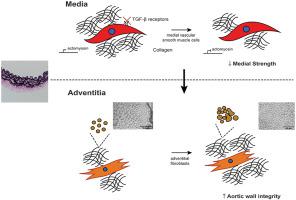Journal of the Mechanical Behavior of Biomedical Materials ( IF 3.3 ) Pub Date : 2021-01-07 , DOI: 10.1016/j.jmbbm.2020.104264 Y Kawamura 1 , S-I Murtada 2 , F Gao 3 , X Liu 4 , G Tellides 5 , J D Humphrey 6

|
Altered signaling through transforming growth factor-beta (TGFβ) increases the risk of aortic dissection in patients, which has been confirmed in mouse models. It is well known that altered TGFβ signaling affects matrix turnover, but there has not been a careful examination of associated changes in structure-function relations. In this paper, we present new findings on the rupture potential of the aortic wall following late postnatal smooth muscle cell (SMC)-specific disruption of type I and II TGFβ receptors in a mouse model with demonstrated dissection susceptibility. Using a combination of custom computer-controlled biaxial tests and quantitative histology and immunohistochemistry, we found that loss of TGFβ signaling in SMCs compromises medial properties but induces compensatory changes in the adventitia that preserve wall strength above that which is needed to resist in vivo values of wall stress. These findings emphasize the different structural defects that lead to aortic dissection and rupture – compromised medial integrity and insufficient adventitial strength, respectively. Relative differences in these two defects, in an individual subject at a particular time, likely reflects the considerable phenotypic diversity that is common in clinical presentations of thoracic aortic dissection and rupture. There is, therefore, a need to move beyond examinations of bulk biological assays and wall properties to cell- and layer-specific studies that delineate pathologic and compensatory changes in wall biology and composition, and thus the structural integrity of the aortic wall that can dictate differences between life and death.
中文翻译:

外膜重塑可防止晚期平滑肌特异性 TGFβ 信号破坏后的主动脉破裂
通过转化生长因子-β (TGFβ) 改变信号会增加患者主动脉夹层的风险,这一点已在小鼠模型中得到证实。众所周知,改变的 TGFβ 信号会影响基质转换,但尚未仔细检查结构-功能关系的相关变化。在本文中,我们提出了在具有解剖易感性的小鼠模型中,在出生后晚期平滑肌细胞 (SMC) 特异性破坏 I 型和 II 型 TGFβ 受体后主动脉壁破裂潜力的新发现。结合使用定制的计算机控制双轴测试和定量组织学和免疫组织化学,我们发现 SMC 中 TGFβ 信号传导的丧失会损害内侧特性,但会引起外膜的补偿性变化,从而保持壁强度高于抵抗体内壁应力值所需的强度。这些发现强调了导致主动脉夹层和破裂的不同结构缺陷——分别损害了内侧完整性和外膜强度不足。这两个缺陷的相对差异,在特定时间的个体受试者中,可能反映了在胸主动脉夹层和破裂的临床表现中常见的相当大的表型多样性。因此,有必要超越对大量生物测定和壁特性的检查,转向细胞和层特异性研究,描述壁生物学和组成的病理和补偿性变化,









































 京公网安备 11010802027423号
京公网安备 11010802027423号